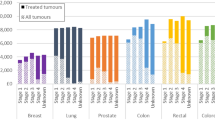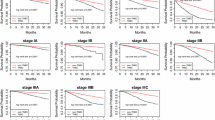Abstract
Background
For elderly patients with early-stage breast cancer, the standards of care often are not strictly followed due to either clinician biases or patient preferences. The authors hypothesized that forgoing radiation and lymph node (LN) staging for elderly patients with early-stage breast cancer would have a negative impact on survival.
Methods
From the Surveillance, Epidemiology, and End Results Program database, 53,619 women older than 55 years with stage 1 breast cancer who underwent breast conservation surgery were identified. Analyses were performed to compare the characteristics and outcomes of patients who received the standards of care with LN sampling and radiation and those of patients who did not, with control used for confounders. To account for selection bias from covariate imbalance, propensity score matching was performed. Survival was analyzed using the Kaplan–Meier method.
Results
Older patients were less likely to receive radiation and LN sampling. These standards of care were associated with improved overall survival rates of 15.8 and 27.1 % after 10 years, respectively (p ≤ 0.0001). This survival advantage persisted after propensity score matching, with a 7.4 % higher survival rate for patients who received radiation and a 16.8 % higher survival rate for those who underwent LN staging (p < 0.0001). Lymph node sampling and radiation therapy also conferred a statistically significant improvement in breast cancer-specific survival, with 1.3 and 2.6 % lower mortality rates respectively in the radiated and LN biopsy groups (p < 0.0001).
Conclusions
As patients age, they are less likely to receive the standard of care for stage 1 breast cancer. Even after controlling for other factors, the study showed that failure to adhere to the standards of LN sampling and radiation therapy may have a negative impact in survival.

Similar content being viewed by others
References
Administration on Aging, American Association of Retired Persons. A profile of older Americans (HTML and PDF formats).Retrieved 8 January 2014 at http://purl.access.gpo.gov/GPO/LPS20086.
National Cancer Institute. SEER cancer statistics factsheets: breast cancer. National Cancer Institute, Bethesda, MD, 2013. Retrieved 8 January 2014 at http://seer.cancer.gov/statfacts/html/breast.html.
Hurria A, Wildes T, Blair SL, et al. Senior adult oncology, version 2.2014: clinical practice guidelines in oncology. J Natl Compr Canc Netw. 2014;12:82–126.
Carlson RW, Moench S, Hurria A, et al. NCCN Task Force Report: breast cancer in the older woman. J Natl Compr Canc Netw. 2008;6(Suppl 4):S1–25; quiz S26–7.
Fisher B, Bryant J, Dignam JJ, et al. Tamoxifen, radiation therapy, or both for prevention of ipsilateral breast tumor recurrence after lumpectomy in women with invasive breast cancers of one centimeter or less. J Clin Oncol. 2002;20:4141–9.
Hughes KS, Schnaper LA, Berry D, et al. Lumpectomy plus tamoxifen with or without irradiation in women 70 years of age or older with early breast cancer. N Engl J Med. 2004;351:971–7.
National Comprehensive Cancer Network (U.S.) The complete library of NCCN clinical practice guidelines in oncology. National Comprehensive Cancer Network, Rockledge, 2014.
Schonberg MA, Marcantonio ER, Li D, Silliman RA, Ngo L, McCarthy EP. Breast cancer among the oldest old: tumor characteristics, treatment choices, and survival. J Clin Oncol. 2010;28:2038–45.
van de Water W, Bastiaannet E, Dekkers OM, et al. Adherence to treatment guidelines and survival in patients with early-stage breast cancer by age at diagnosis. Br J Surg. 2012;99:813–20.
Giordano SH, Hortobagyi GN, Kau SW, Theriault RL, Bondy ML. Breast cancer treatment guidelines in older women. J Clin Oncol. 2005;23:783–91.
Weggelaar I, Aben KK, Warle MC, Strobbe LJ, van Spronsen DJ. Declined guideline adherence in older breast cancer patients: a population-based study in the Netherlands. Breast J. 2011;17:239–45.
Wanebo HJ, Cole B, Chung M, Vezeridis M, Schepps B, Fulton J, Bland K. Is surgical management compromised in elderly patients with breast cancer? Ann Surg. 1997;225:579–86; discussion 586–579.
Yood MU, Owusu C, Buist DS, et al. Mortality impact of less-than-standard therapy in older breast cancer patients. J Am Coll Surg. 2008;206:66–75.
Luu C, Goldstein L, Goldner B, Schoellhammer HF, Chen SL. Trends in radiotherapy after breast-conserving surgery in elderly patients with early-stage breast cancer. Ann Surg Oncol. 2013;20:3266–73.
Yancik R, Wesley MN, Ries LA, Havlik RJ, Edwards BK, Yates JW. Effect of age and comorbidity in postmenopausal breast cancer patients aged 55 years and older. JAMA. 2001;285:885–92.
Fisher B, Anderson S, Bryant J, et al. Twenty-year follow-up of a randomized trial comparing total mastectomy, lumpectomy, and lumpectomy plus irradiation for the treatment of invasive breast cancer. New Engl J Med. 2002;347:1233–41.
Favourable and unfavourable effects on long-term survival of radiotherapy for early breast cancer: an overview of the randomised trials. Early Breast Cancer Trialists’ Collaborative Group. Lancet. 2000;355:1757–70.
Veronesi U, Paganelli G, Galimberti V, et al. Sentinel-node biopsy to avoid axillary dissection in breast cancer with clinically negative lymph-nodes. Lancet. 1997;349:1864–7.
Veronesi U, Paganelli G, Viale G, et al. A randomized comparison of sentinel-node biopsy with routine axillary dissection in breast cancer. New Engl J Med. 2003;349:546–53.
Pierce SM, Recht A, Lingos TI, et al. Long-term radiation complications following conservative surgery (CS) and radiation therapy (RT) in patients with early-stage breast cancer. Int J Radiat Oncol Biol Phys. 1992;23:915–23.
Hieken TJ, Nettnin S, Velasco JM. The value of sentinel lymph node biopsy in elderly breast cancer patients. Am J Surg. 2004;188:440–2.
Gennari R, Rotmensz N, Perego E, dos Santos G, Veronesi U. Sentinel node biopsy in elderly breast cancer patients. Surg Oncol. 2004;13:193–6.
Martelli G, Boracchi P, De Palo M, et al. A randomized trial comparing axillary dissection to no axillary dissection in older patients with T1N0 breast cancer: results after 5 years of follow-up. Ann Surg. 2005;242:1–6; discussion 7–9.
Wazer DE, Erban JK, Robert NJ, et al. Breast conservation in elderly women for clinically negative axillary lymph nodes without axillary dissection. Cancer. 1994;74:878–83.
International Breast Cancer Study G; Rudenstam CM, Zahrieh D, et al. Randomized trial comparing axillary clearance versus no axillary clearance in older patients with breast cancer: first results of International Breast Cancer Study Group Trial 10-93. J Clin Oncol. 2006;24:337–44.
Disclosure
None.
Author information
Authors and Affiliations
Corresponding author
Rights and permissions
About this article
Cite this article
Sun, S.X., Hollenbeak, C.S. & Leung, A.M. Deviation from the Standard of Care for Early Breast Cancer in the Elderly: What are the Consequences?. Ann Surg Oncol 22, 2492–2499 (2015). https://doi.org/10.1245/s10434-014-4290-5
Received:
Published:
Issue Date:
DOI: https://doi.org/10.1245/s10434-014-4290-5




